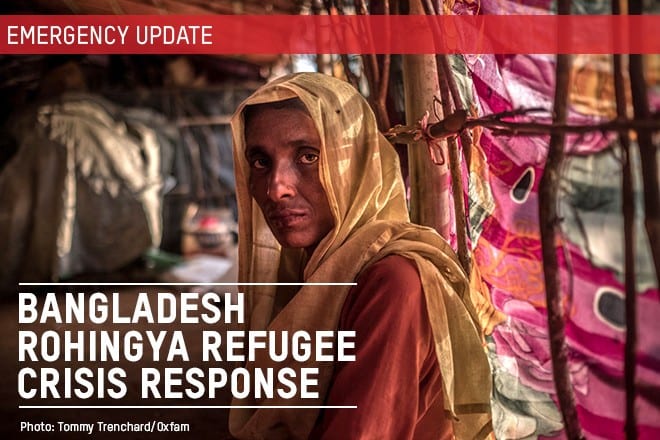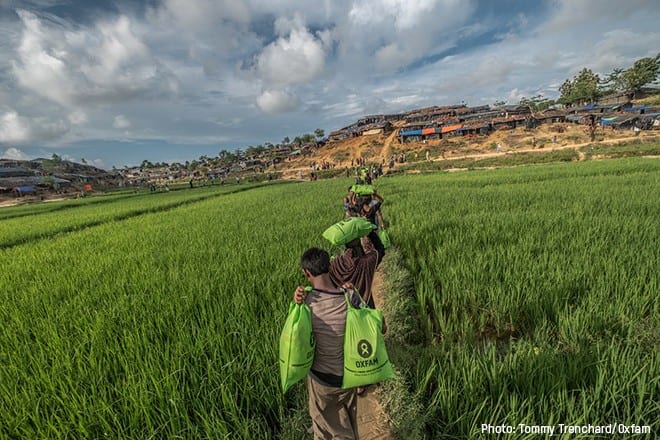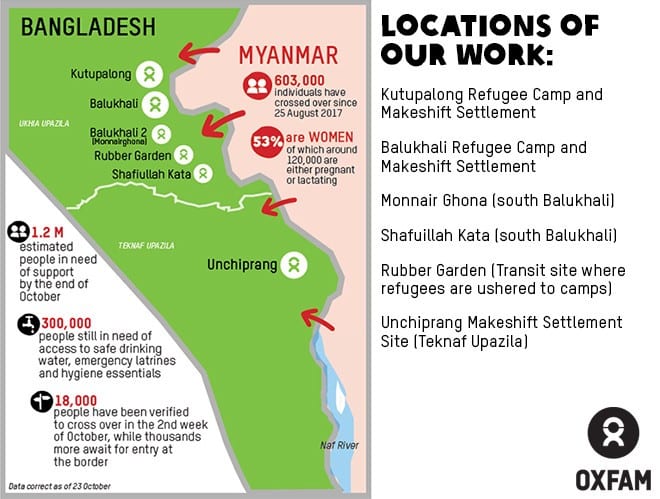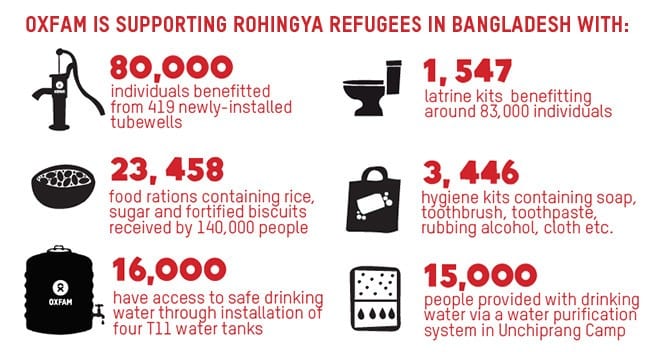
Two months into the crisis, more than 603,000 Rohingya refugees have crossed over into southern Bangladesh, while thousands are still trapped in the border. According to the UN, the pace of new arrivals made this crisis the fastest growing refugee crisis in the world, and the concentration of refugees in Cox’s Bazar is now amongst the densest in the world.
In the early hours of 25 August 2017, violence broke out in the Northern Rakhine State of Myanmar and has driven more than 603, 000 people across the border into Cox’s Bazar and Bandarban Districts, southern Bangladesh. The people who have fled join the more than 300,000 others already living in cramped and makeshift camps since the 1990s, bringing the total refugee population to 815,200, as of 23 October, according to the United Nations.
Overall situation
The extent and implications of the large influx have resulted in a critical humanitarian emergency. The Rohingya refugees have faced a treacherous journey across the border fleeing the violence in Northern Rakhine.
The United Nations High Commissioner for Human Rights reports of women and girls, as young as five years old, being raped by men in army uniforms as they fled their homes. High numbers of gender-based violence and trauma survivors require appropriate specialized services, including clinical management of rape, surgical intervention and mental health and psychosocial support.
They are in urgent need of lifesaving assistance in food, water, sanitation, shelter, health, and strong support in place to ensure their safety, dignity and respect for individual rights.
The large number of people initially started taking shelter under the open sky in the forest areas, by the roadside, and in surrounding villages. The population movements within Cox’s Bazar remain highly fluid, with an increasing concentration in Ukhia, where the government has recently allocated 3,000 acres for a new camp.
More than half of the refugees are women and 60 percent of these are girls under the age of 18. There are more than 120,000 pregnant women and mothers with new babies who are among those struggling to survive in cramped camps and settlements that are ill-equipped to deal with their needs.
“There is no toilet or bathroom here. The latrines are far away. The women take a shower at night, we are unable to do it in the daytime.”
Sumaya, 44, lives in Thengkhali Camp with her husband and eight children. They live high on a hilltop and use makeshift latrines or holes in the ground. Two months into the crisis, there is still an estimated 300,000 people with no access to basic sanitation facilities.

Refugees carry Oxfam food parcels in Thengkali Camp, southern Bangladesh. Each food parcel contained three kilograms of rice, fortified biscuits, sugar and soaps. A total of 23,458 parcels have been distributed and benefitted over 140,000 individuals. Photo: Tommy Trenchard/Oxfam
We are there
Oxfam is responding now and has reached more than 185,000 Rohingya refugees in Bangladesh by providing clean drinking water, portable toilets and sanitation facilities, plastic sheets, and other essential supplies. We aim to help more than 200,000 people during the first phase our response.

We are also supporting the government and humanitarian partners to ensure that newly established refugee camps will meet the necessary humanitarian standards.
Our collaboration with partner national organizations, such as the NGO Forum for Public Health and Coast Trust, have brought rich insight into the response as they bring in local knowledge and cultural sensitivity in delivering aid to the affected people.
In the recent weeks, we started working in Rubber Garden, a newly established transit site situated at about six kilometers from Ukhia, near Balukhali refugee camp. An estimated 1,200 individuals have transited over the past week, with some families who have journeyed for more than 15 days before finally crossing the border. We immediately provided a water tank with a total capacity of five cubic meters and delivered 10,000 litres of safe drinking water. We have also built 31 emergency latrines with separate units for men and women.
In Unchiprang, where water is scarce, we have finished installing a surface water treatment system with production of an estimated 45,000 litres of clean drinking water per day. This has benefitted more than 15,000 individuals.

Going forward, our programmes will include clean water and sanitation, hygiene materials and promotion, gender integrated into WASH, and safe spaces for women.





